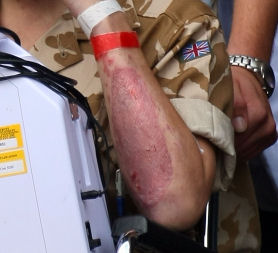Afghan wounded put 'pressure' on UK hospitals
Updated on 10 February 2010
British troops returning from Afghanistan suffering illness and minor injuries are putting UK hospitals under increasing pressure, the National Audit Office (NAO) has said.

The public spending watchdog said the treatment of badly wounded personnel is "highly effective".
But thousands of working days are being lost to less serious complaints like stomach bugs and sprained ankles.
The report recommends that the government carries out more detailed planning for possible scenarios involving a big increase in casualties.
The Ministry of Defence is due to announce an increase in the number of ward beds at its rehabilitation centre, at Headley Court in Surrey, from 66 to 96.
NAO head Amyas Morse said: "The good news is that my report has found that treatment for seriously injured personnel is highly effective.
"Alongside this positive finding, we point out the need to continue to improve contingency planning for facilities in the UK in the context of a longer term conflict, and the importance of increased efforts to prevent disruption due to rising levels of short term illness."
Rates of minor injury and illness among troops deployed to Afghanistan nearly doubled between 2006 and 2009, increasing from 4 per cent to 7 per cent of the total.
In Iraq the rate went up from 5 per cent to 9 per cent over roughly the same period.
The watchdog estimated that 6,700 days were lost in Afghanistan between October 2006 and September 2009 because of the increase.
Possible reasons for the rise could include the intensity of operations, basic living conditions at some forward operating bases or improved reporting of medical data.
The report said: "The rising rates demonstrate that the department needs to do more to assess which prevention measures should be improved to halt the increase."
The NAO also raised concerns about contingency planning for what to do if Afghanistan casualty numbers overwhelm the specialist military facility at Selly Oak Hospital in Birmingham.
There is a voluntary agreement in the West Midlands to maximise the number of injured troops cared for at Selly Oak by diverting civilian trauma patients to other hospitals in the region.
If there is no room for military casualties at Selly Oak, they will be treated first in hospitals in the region, then nationally.
A total of 522 UK service personnel were seriously injured on operations in Iraq and Afghanistan between October 2001 and October 2009, with the peak in July last year.
British troops have attended medical facilities about 125,000 times for treatment of minor injuries and illnesses since 2006, and some 6,900 have been evacuated back to the UK since 2003.
The cost of medical care as a result of Britain's military operations was estimated to be £71 million in 2008-09.





